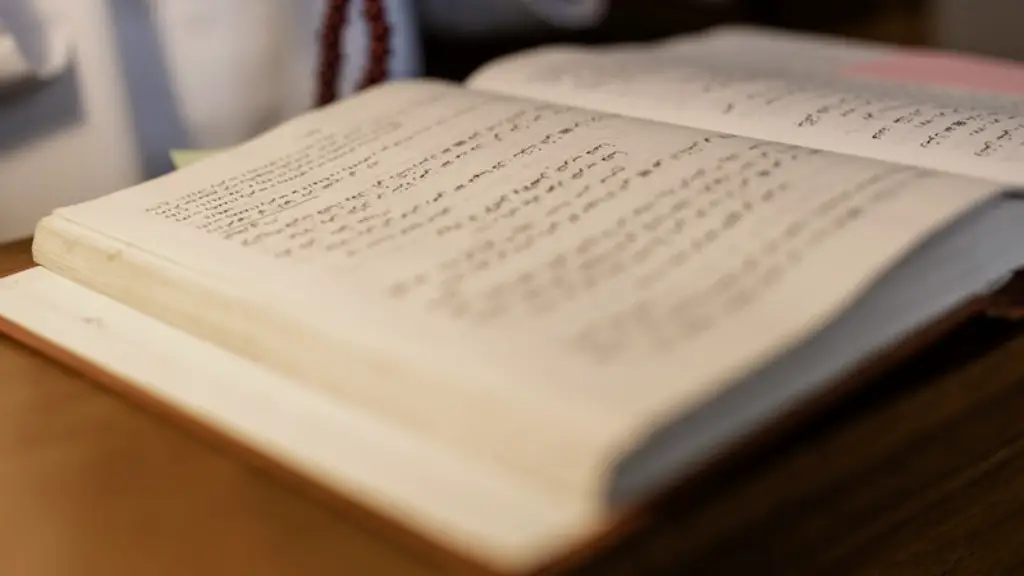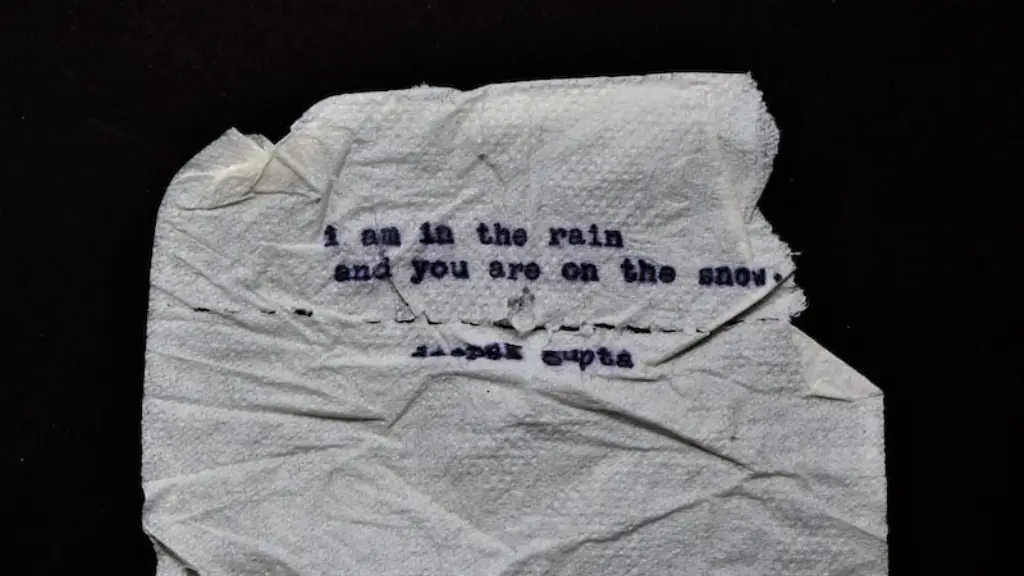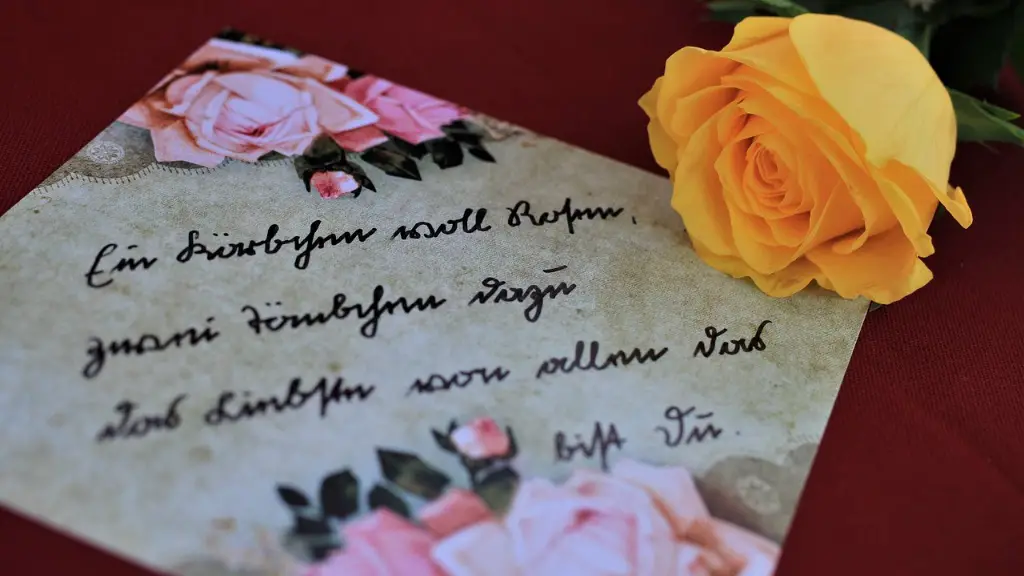What is a Poetry?
Poetry is a literary form of art that uses words and expression to evoke beauty, emotion and meaning. It comes in many forms, from the traditional sonnet to the more abstract use of visual representations, and even to the use of poetic devices that create new meanings from simple words. Poetry is a way for the poet to manipulate words, to create something unique and powerful on the page. It is intended to evoke a response, to communicate a feeling, or to illustrate an interesting idea.
When a poet puts together a poem, they choose words carefully, trying to capture something in their particular way. They use symbols, imagery, and metaphors to describe a person, place, or thing in the most beautiful and evocative way they can. Poetry, while written to be read, can also be recited, sung, or performed in other ways. While there are some preset structures, like the sonnet, most of the time the poet is allowed to explore freely in their own work.
By using certain techniques, like rhyming and alliteration, poets can create sound patterns that enrich the poem and make it more enjoyable. Written and oral poetry often rely on these tricks, but visual poetry can be made with a collage of images to create a new work of art.
History of Poetry
Poetry has been a part of human culture for thousands of years. This widespread practice hints at the appreciation people had for the power of words to express and connect with others. One of the oldest known piece of poetry, the Epic of Gilgamesh was written in ancient Mesopotamia in 2100BCE. Ancient poets also wrote lyrics, odes and hymns, providing a framework for the Western poetic tradition.
Poetry continued to flourish and evolve throughout time, with the Renaissance period in Europe producing a particularly rich period of production. The 18th and 19th centuries saw the emergence of new forms of writing, such as the expanded use of free verse, the rise of the ballad and the rise of poetry as an art form.
Today, poetry is still widely appreciated and practised across the world in multiple forms. The internet has made it easier for readers to access and even for poets to share their work with a global audience. This has provided an acceleration of possibility for poets, allowing readers to discover new voices, inspiring new works, and creating and sustaining a vibrant movement of poets and poetry lover.
The Value of Poetry
Poetry as a medium has been able to retain its relevance and value to society over centuries because of its ability to take a solitary experience and make it collective. Poetry speaks to the shared experience of being alive, enabling us to connect deeply with each other and explore our individual thoughts and feelings. It can offer insight, provoke emotion, and explore complex and intangible concepts in ways not possible through the succinctness of prose.
Moreover, it is able to do all this without having to be explicit about its meaning, allowing readers to create their own interpretation of the text and connect with it in their own way. This makes it especially powerful and helps explain why it has been so important over the years.
It is not just meaningful in an expressive sense, however, but can also be economically valuable. Poetry can be lucrative, with many poets making a living from their craft due to the success of their books, the commissions they secure and prize money they can receive.
How to become a poet
Becoming a poet is accessible to anyone with a love of words. The most important thing to do is to read, listen and absorb as much as you can. Reading can be used to familiarise oneself with the various poetic techniques and writing styles of established poets. Additionally, it’s important for aspiring poets to develop a keen sense for language and how words fit together, as well as how to communicate an idea or emotion in an effective, yet poetic manner.
It is common for poets to start by writing poems in a variety of different manners or forms. Just like an artist likes to experiment with styles, a poet can also explore different modes of expression through their writing. This can be simple rhymes, metaphors, or spoken word-style pieces. Writing regularly can help to build confidence, as well as allowing poets to review and observe their own progress over time.
Writing often leads to the desire to be published, either in anthologies or magazines, or by submitting work directly to publishers. This requires excellent self-editing and the ability to rewrite in order to create the best possible poem. It is vital to take rejection as a learning opportunity, as painful as it can be. Pointing out the specific weaknesses of the work can be an invaluable way to perfect one’s skills.
The Oral Tradition
Poems have traditionally been used as a form of oral storytelling, a way of transmitting shared histories, values, and cultural beliefs. Throughout the ages, different forms of poetry have been popularised in different cultures, from ancient Japan’s haiku to Brazil’s Cordel poetry. Poetry was also the primary form of entertainment for much of history, celebrated by single listeners and large audiences alike.
Even in the age of digital media, poetry is kept alive in many different parts of the world by performance poets, spoken word artists, and reciters of ancient works. Even open mic nights, which may not conform to traditional strictures, still contain a large portion of poets seeking to express their thoughts and entertain an audience.
In this modern era, poetry can be an extremely rewarding and cathartic practice. Anyone can have access to the written word and begin to express themselves, seeking to connect with the people and the world around them. It requires dedication, skill, and quite a bit of practice, which is ultimately worthwhile as a poet discovers their own writing style.
Using Technology to Grow Poetry
In recent times, technology has played a huge role in the way poetry is being accessed, created and shared. With the rise of the internet and the popularisation of social media, poets now have access to an infinitely larger audience. Platforms such as Medium and WordPress make it easy for aspiring poets to publish their work, enabling them to develop a name for themselves in their community, as well as potentially reaching out to a global audience.
Technology also provides tools that help find the perfect words or expressions, formulating the desired hints of beauty through well-chosen words. Apps such as Rhymezone and Poet Assistant are useful for finding the right combination for a poetic line. Additionally, sites like Goodreads have enabled people to share their reviews and opinions on books, magazines and even poems, further connecting authors and poets to readers.
With access to so many resources, we can help ensure poetry continues to thrive today, as it has done in countless generations before us. Being part of this tradition is to connect with a collective, timeless human experience.
Writing Poetry During Difficult Times
Poetry is so often considered an art of healing and solace, as it helps us understand and connect with ourselves as well as with others. Writing a poem during dark times may not provide an immediate solution, but it can be an anchor of sorts, something to cling to during a period of distress. Poetry at its best is a form of self-exploration, one that resonates in us, even if it may never be seen by another eye.
By setting pen to paper, a poet can find clarity in the chaos. Writing can be meaningful, even if a poet doesn’t have the right words. The act of writing itself, the attempt to express their pain, can be healing in and of itself. Those deeply personal moments of vulnerability and honesty can be liberating and provide an opportunity to make sense of an otherwise confusing world.
In addition, putting words on a page can help us to resist the growing trend of social media isolation, allowing us to reach out in times of struggle. Pouring all of one’s thoughts into poetry can be a way to make a connection without having to be physically present. This can in turn magnify one’s self-awareness, giving the poet a sense of understanding themselves and their world.
Poetry For Social Change
A passionate collection of words has often been at the forefront of social movements, fighting for the causes of justice and liberation, and poetry has played no small part in leading people to a better understanding of themselves and their world.
Because of its power to adapt to many different styles and forms, poetry has been a tried and tested tool for highlighting injustice, expressing dissent, and unifying people in the fight against oppression. Poets such as Langston Hughes, Audre Lorde, and Anne Sexton, who have spoken out of the defiance of a power structure trying to keep them or their words subdued, are only some examples.
Examples of using poetry to affect social change can be found all around us and not limited to past eras. Poems such as ‘Poem for Black Girls’ by Mahogany L. Browne, which made its debut at the 2017 Women’s march in Washington D.C, or the work of Anshula Kapur who uses her poems to fight the stigma of mental illness, are further examples of powerful words being used to make a difference in society.
Poetry is, ultimately, a powerful tool to express meaningful thoughts, stories and feelings. We can use it to create moments of joy and hope, and in doing so become part of a collective timeless experience.





